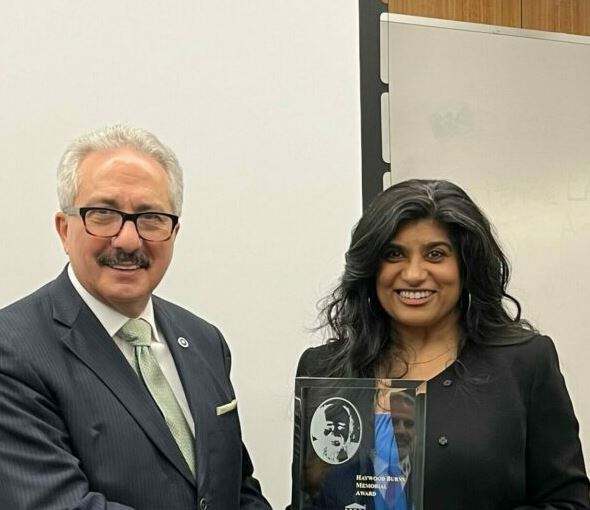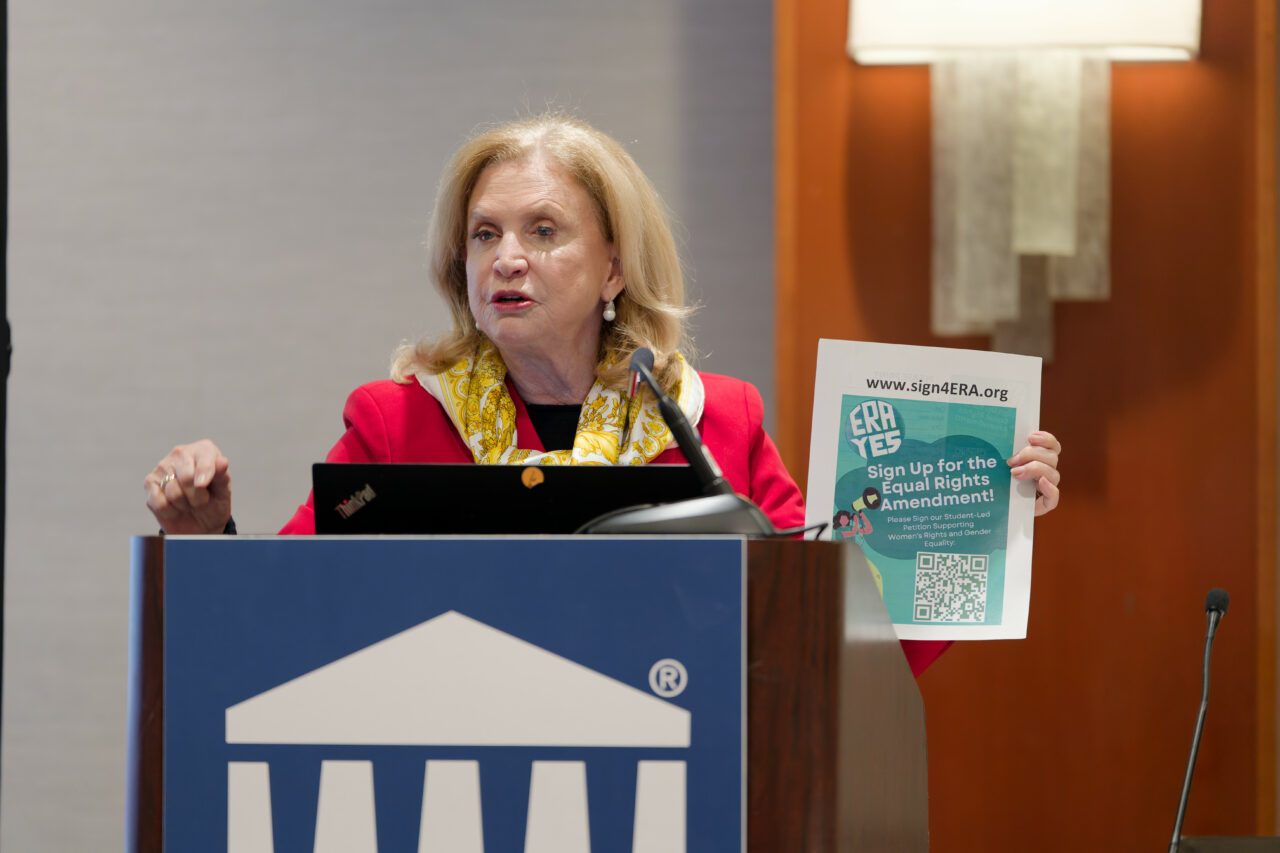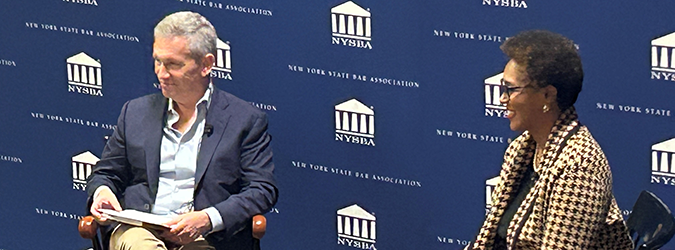In Iran, Women Lead the Way in the Fight for Justice
12.12.2022
If you’ve walked around New York City recently, you may have heard the rallying slogan of “Women, Life, Freedom,” or, in Persian, “Zan, Zendegi, Azadi.” From Washington Square to Times Square, demonstrations and rallies are calling for support of Iranian women who have, since Sept. 16, been leading a renewed revolution against the fundamentalist Islamic regime.
The Iranian diaspora rallying in numerous U.S. and European cities are amplifying protestors on the streets and in the prisons of Iran. The uprisings began after the news about the death in police custody of a 22-year-old woman named Mahsa Zhina Amini became widely known through social media. The protestors’ chants include “Mullahs get lost,” “We don’t want an Islamic republic,” and “Death to the supreme leader [Khamenei],”[1] calling for the overthrow of an abusive and corrupt regime.
Amini was visiting Tehran with her family from Saqiz, a predominantly Kurdish town in Western Iran, when she was unexpectedly and suddenly detained by the “morality police” for having supposedly covered her hair too loosely with her head scarf. Hours later, she was in a coma at the hospital, bruises on her face and blood dripping from her ear.
Amini’s death from injuries sustained under police custody has sparked outrage in Iran and calls for revolution against the Islamic Republic. A billboard in Time Square on Oct. 26 included her photo, commemorating the 40th day of her death.
A History of Human Rights Abuse
Human rights violations are not new in Iran. Neither are protests in support of civil and political rights. In 1979, a popular revolution overthrew Mohammad Reza Shah Pahlavi, who was widely seen as corrupt and unrepresentative of the Iranian people. Iranians then largely sought a secular democratic government, free of Western influence. In the chaos that followed, Ayatollah Khomeini established the Islamic Republic of Iran, a regime that fundamentally changed the legal, social and political system of the country.
Iran had until that time been a multi-religious and multi-ethnic nation. After Khomeini consolidated his power, there was a mass exodus of Christians, Jews, Baha’is, Turks and Kurds, as well as anyone whose political views or speech were contrary to those of the new Islamic government.
Mandatory Islamic dress codes, including a hijab for women, were among the decrees that Khomeini’s regime instituted. On March 8, 1979 – International Women’s Day – the women’s rights organizations mobilized. Thousands of women gathered on the streets of Tehran to protest mandatory veiling and in support of equal rights and non-discrimination. Viewed in historical context, Iranian women have been leading a fight for justice for over 40 years, despite violent threats to their lives and livelihoods.
What Solution? Revolution!
What began this year as women-led protests and hijab-burning has expanded to a revolution by a broad cross-section of the Iranian people demanding an end to the Islamic regime. Men and women of all ages, from teens to the elderly, are actively engaged. Generation Z is at the forefront, and a number of teenagers and even younger children have become vocal elements of the movement. Labor strikes, merchant boycotts and even the burning of the childhood home of Imam Khomeini, the original leader of the 1979 Islamic regime, demonstrate the widespread anger among the population. This revolution has been in the making for 40 years.
The regime’s crackdown has reportedly targeted minors, using the same brutal imprisonment, torture and punishment tactics against teenage boys and girls that it does against adults. The U.N. reports that at least 14,000 people have been arrested since the protests began this fall, and some estimate this figure is closer to 20,000. There are reports of widespread torture and a fire of unknown origin at Evin Prison, a facility notorious for detaining, torturing and murdering political prisoners since the 1980s. This is a large-scale humanitarian crisis and must be addressed as such by the international community.
Notably, Mahsa Amini was an Iranian Kurd, thus the Iranian Kurdish community has mobilized in their opposition to the Islamic regime.[2] This risks regional conflict, as the opposition Kurdish leaders and other dissenters are based in, or recently escaped to, Kurdish bases in Iraq. The Iranian Revolutionary Guards Corps, a paramilitary group currently devoted to the Islamic government, launched targeted missiles at the Kurds in Iraq in early November, prompting the U.S. State Department and the U.N. mission in Iraq to condemn the attacks as a violation of Iraq’s sovereignty.
The International Community and Diplomacy Called to Action
The Islamic Republic threatens not only its own citizens, but also peace and stability internationally. It recently supplied drones that the Russians used in the war against Ukraine. It funds and trains Shia militias in several countries, including Lebanon, Iraq, Syria and Yemen.[3] It has continued to attack Kurds in neighboring Iraq and has backed attacks against Israel. The U.S. State Department has designated it as a state sponsor of terrorism.
Standing in solidarity with the Iranian people against the Islamic regime should be a priority for the international community. Naming the protests as an act of revolution honors the voice of Iranians who are putting their lives on the line for basic, universal values. It also helps contain a terrorist regime that threatens global stability.
France and Canada have been leaders in demonstrating the important role of law and diplomacy in this crisis, and they should continue to escalate diplomatic aims. French President Macron recognized the people’s movement in Iran as a revolution and met with several Iranian activists to learn more about and support their cause.[4]
The Canadian government designated the Iranian regime and Iranian Revolutionary Guard Corps as a terrorist organization, and identified senior members who will be sanctioned and banned from entry to Canada.[5] The EU is likely to impose similar sanctions, while the U.S., which had previously designated the Iranian Revolutionary Guard Corps as a terrorist organization, added additional sanctions on companies doing business with Iran, yet stopped short of imposing travel bans on regime officials.
The international community must support the Iranian people amid this crisis by increasing the isolation of the Iranian regime and refusing to treat it as a legitimate government. Governments should strengthen sanctions against the leadership of the Islamic Republic, freeze the assets of regime officials, recall ambassadors from Iran and close their embassies there. They should also publicly press for the release of all political prisoners. Now is the time for diplomacy to show its might and support calls for democratic governance.
The Iranian government is a signatory to numerous international conventions and treaties of which it is currently in breach. Those include the International Convention on the Rights of the Child, the International Covenant on Civil and Political Rights, the International Covenant on Economic, Social and Cultural Rights, and the International Convention on the Elimination of All Forms of Racial Discrimination.[6] The regime’s gross human rights violations are running afoul of these laws, and the U.N. should take stronger action.
There is strong momentum to remove Iran from the 45-member U.N. Commission on the Status of Women, an organization whose mission is to be a “global champion for women and girls.” The U.S. government and non-governmental organizations such as Vital Voices are calling for removal, which they believe is an “ugly stain” on the commission’s credibility considering their human rights record.[7] The U.N. Economic and Social Council will meet on Dec. 14 to consider the petition.
Recent U.N. action to provide accountability for human rights violations provide some hope for justice. On Nov. 24, the U.N. Human Rights Council voted to establish a fact-finding investigation into human rights abuses in Iran in connection with the recent protests, an important step that could make prosecutions more likely in international courts.
Civil society and professional organizations also have a key role to play in these measures and in maintaining pressure both on Iran and policy makers responding to the Islamic regime’s illegal conduct and human rights abuses. To this end, New York State Bar Association President Sherry Levin Wallach and the International Section’s Rapid Response Committee have expressed solidarity with Iranian women and others fighting for justice, and grave concern about the brutality and crackdown against them.[8]
The coming months in Iran will inevitably be bloody. The people of Iran are doing their part to fight for the rule of law. The international community should stand in solidarity with them.
[1] Cora Engelbrecht and Farnaz Fassihi, Protests Intensify in Iran Over Woman Who Died in Custody, N.Y. Times, Sept. 21, 2022, https://www.nytimes.com/2022/09/21/world/middleeast/iran-protests-mahsa-amini.html.
[2] Jane Arraf and Sangar Khaleel, Iran Attacks Opposition Bases in Iraq’s Kurdistan Region, N.Y. Times, Nov. 14, 2022, https://www.nytimes.com/2022/11/14/world/middleeast/iran-attack-iraq-kurdistan-region.html.
[3] Ashley Lane, Iran’s Islamist Proxies in the Middle East, Wilson Center, May 20, 2021, https://www.wilsoncenter.org/article/irans-islamist-proxies.
[4] Macron Calls Iran Protests a ‘Revolution,’ Says Crackdown Harms Nuclear Deal Chances, France 24, Nov. 14, 2022, https://www.france24.com/en/middle-east/20221114-macron-calls-iran-protests-a-revolution-says-crackdown-harms-nuclear-deal-chances.
[5] Senior Officials of the Iranian Government Officially Banned From Canada, Canada Border Services Agency, Nov. 14, 2022, https://www.canada.ca/en/border-services-agency/news/2022/11/senior-officials-of-the-iranian-government-officially-banned-from-canada.html.
[6] Ratification of 18 International Human Rights Treaties, United Nations, https://indicators.ohchr.org/.
[7] Margaret Besheer, US Calls for Iran to be Removed From UN Women’s Rights Commission, VOA News, Nov. 2, 2022, https://www.voanews.com/a/us-to-press-for-iran-s-removal-from-un-women-s-rights-body/6817458.html.
[8] Susan DeSantis, New York State Bar Association Gravely Concerned About Iranian Government Crackdown, NYSBA, Oct. 21, 2022, https://nysba.org/new-york-state-bar-association-gravely-concerned-about-iranian-government-crackdown/.






